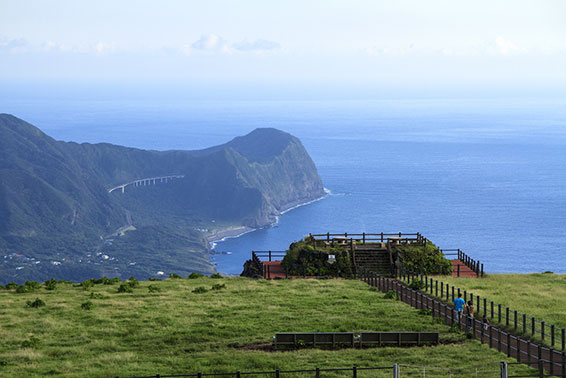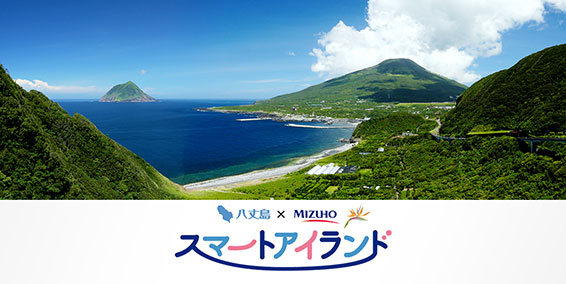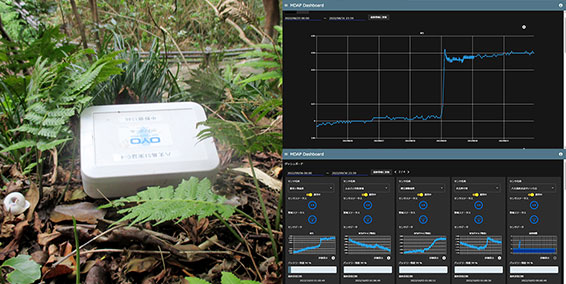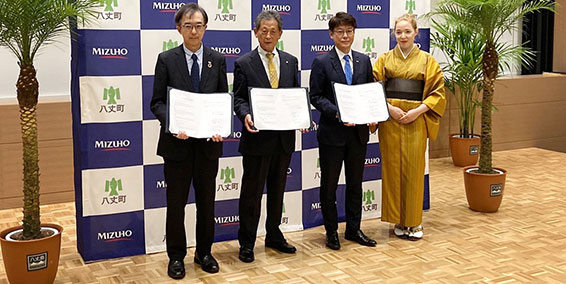Smart island: Making a remote island more accessible and sustainable
Mizuho Digital Transformation
October 26, 2022

(Hachijojima Tourism Association)
Mizuho Digital Transformation
October 26, 2022

(Hachijojima Tourism Association)
Hachijo Island, the closest sub-tropical island to Tokyo, offers splendid views of the sea, mountains, and the sky, such that one could gaze at the scenery all day long and never tire. The island has much to offer, including opportunities to see humpback whales and to walk through lush forests inhabited by living, natural treasures. However, in recent years, the island has been facing some challenges including a downtrend in both overall population and the number of households. The population aged 65 or older accounts for 40.6% of the total (as of April 1, 2021), which is significantly higher than Japan's national average of 29.1% (as of September 15, 2021).
In April 2021, Hachijo Town was designated as an underpopulated area and facing a wide range of other issues including increasingly severe natural disasters, such as landslides caused by torrential rains, and the decline in the number of tourists and tourism spending due to COVID-19. Mizuho Bank, as the only megabank with a presence on the island, began working together with local leaders and citizens to see how digitalization can make the island more accommodating for both tourists and local residents, and, in turn, lead to the creation of a more sustainable community.

The goal of this project has been to make Hachijo Island a "smart island," whereby the government, the private sector, and academia work together to introduce new technologies and knowledge to solve the problems facing the remote island. A sustainable approach is being used to attract people while ensuring the convenience, safety, and privacy of island life.
As a first step, the local municipal government and Mizuho Bank worked together to make the island a cashless economy, aiming to make life easy and more convenient for residents and visitors. Until recently, cash was the main form of payment on the island, which proved to be a frustrating hassle for residents and tourists alike due to the limited number of ATMs available. In response, Mizuho Bank introduced J-Coin Pay, a cashless payment service. We launched a campaign to encourage the use of J-Coin Pay for COVID-19 benefit payments as a way to help revitalize the local economy.
To streamline the use of J-Coin Pay and spur quicker adoption and widespread usage among businesses on the island, we assisted residents in accessing the new system. With the initial success of J-Coin Pay, discussions to expand the service to municipal facilities and hospitals are underway. Although we are seeing a successful transition to cashless payments, there are still challenges inherent to a remote island with a lack of accessibility, limited ownership of smart phones, and demographic groups with varying degrees of comfort with technology. As a solution, and in tandem with the smartphone app, we are looking into employing a contactless payment system that uses biometric authentication technology such as facial recognition, which will enable all generations to use the service without cumbersome procedures.

Hachijo Island lies in the Pacific Ocean, 55 minutes by air or 11 hours by ferry from Tokyo. The island receives approximately 129 inches of rainfall per year, more than twice the annual rainfall of central Tokyo. Despite the danger of flooding and landslides, there is no easy way to escape the island in the event of an emergency. Therefore, it is essential to take thorough measures to protect the island’s people and their livelihoods. Mizuho Bank, together with OYO Corporation, a firm specializing in disaster prevention and mitigation using sensor technology for detecting soil movement; and Nippon Koei Co., Ltd., a construction consulting firm, teamed up with local residents to introduce a smart disaster prevention system that utilizes IoT disaster prevention sensors. For example, when it rains and as the ground tends to soften, the sensors can detect the tilt of the ground, helping monitor the risk of landslides. If safety thresholds are exceeded, the cloud server alerts municipal officials and other disaster response personnel who can provide early and appropriate guidance on evacuation to nearby residents. As disasters call for quick and accurate responses, Mizuho Bank and its partners are using technology to lighten the burden of the responders as much as possible.
In addition to cashless payments and disaster prevention, Hachijo Town will also use digital technology for its tourism industry. It will be conducting observational research using AI image recognition technology and developing eco-tourism apps which will continue to encourage tourism while protecting the natural flora and fauna unique to the island, including humpback whales.
All of the island's primary industries of tourism, agriculture, and fisheries will benefit from digital transformation, as the island continues to evolve and enhance its appeal to residents and visitors alike.
Our efforts on Hachijo Island are ongoing and not limited to just the island itself. We have started collaborating with the surrounding local communities and businesses outside the island, and continue to leverage our group-wide capabilities – both financial and non-financial – to deliver digital solutions that address the social and environmental issues faced by local communities across Japan and beyond.
